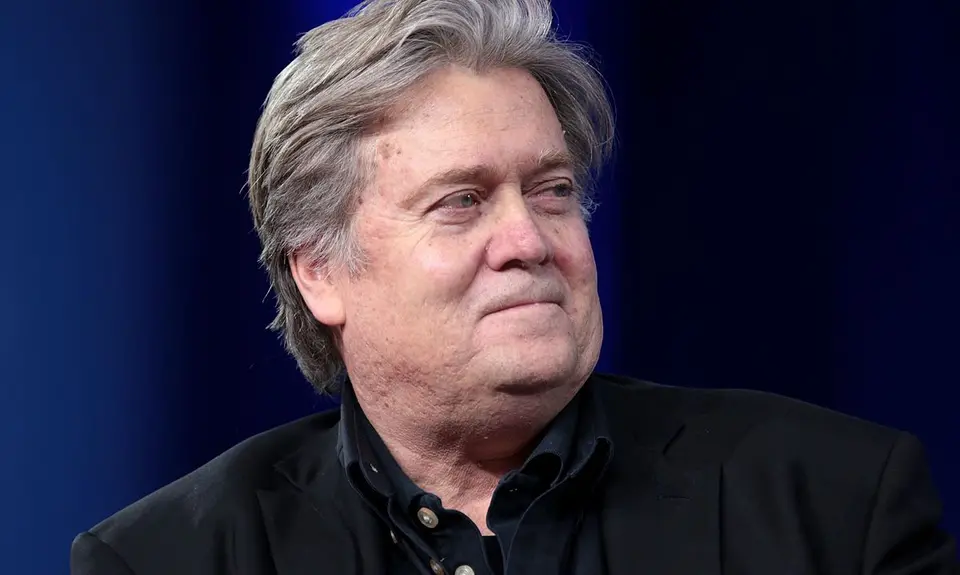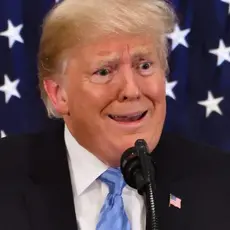analysis
When President Donald J. Trump delivered his latest market-rattling remarks on the coronavirus pandemic from the Oval Office on Wednesday night, political reporters collectively scratched their heads over the president's announcement of a ban on travelers from Europe and cargo coming from the continent. (The cargo ban was later walked back.)
But anyone paying attention to the rise of the global right knew what Trump was up to: using well-founded fears of the virus's spread in the U.S. to strengthen the hand of Stephen K. Bannon, Trump's erstwhile chief White House strategist, in the former's quest to weaken the European Union.
In his remarks, Trump blamed European travelers for "seeding" the "foreign virus"—first identified in China—on American shores, and blamed Europe for the spread of the new coronavirus, because, he said, the E.U. had not banned travel from China as the U.S. has. "And taking early intense action, we have seen dramatically fewer cases of the virus in the United States than are now present in Europe," Trump said, conveniently omitting the fact that Europe has a viable testing regimen, while it's still impossible for most people in the U.S. to obtain a test for COVID-19, as the new coronavirus is formally known. Consequently, no one knows just how many people in the land of the free are freely walking around, spreading the virus. Nor do we know how many deaths from respiratory failure are due to the new virus.
While a number of claims made by Trump in the remarks he delivered from the Resolute Desk have since been walked back by various government agencies, it is notable that a clarification from the Department of Homeland Security says that the European countries affected by the executive order signed by Trump include only those in the Schengen area, which means those that are party to a multi-nation agreement to maintain open borders among them. Most of those 22 nations are members of the E.U.
In other words, this is an ideological and punitive action against those nations for daring to act in coalition—and for having demonstrated, since 1985, the value of such a compact.
Since before his ouster from the White House (for saying mean things about Trump's son, Don Jr., daughter Ivanka and son-in-law Jared Kushner that were reported in the Michael Wolff book, "Fire and Fury"), Bannon has been working on growing the right-wing nationalist parties in Europe, Brazil and elsewhere, with a foremost goal of busting up the E.U. While he served as an executive at Cambridge Analytica, Bannon helped fuel the Brexit referendum that has led to the United Kingdom's departure from the E.U.
In his Wednesday-night remarks, Trump said that the U.K. would be exempt from his European travel ban—never mind that confirmed COVID-19 cases in the U.K. leapt by more than 20 percent since Trump spoke to the American people yesterday from the Oval Office, now standing at 596, with 20 deaths reported. "However," according to the BBC, "the actual number of people infected could be between 5,000 and 10,000, the government's chief scientific adviser Sir Patrick Vallance said."
Politico notes that the parameters of his European travel ban functionally exempt travelers from Trump's own properties in Scotland and Ireland.
In addition, Trump's framing of COVID-19 as a "foreign virus" fits neatly into one of Bannon's newer projects, a group he calls Committee on the Present Danger: China, whose major donor, Guo Wengui, appears to be Bannon's latest sugar daddy, now that he's said to have been abandoned by his former patrons, Robert and Rebekah Mercer.
While Trump and Bannon may have their personal differences, it is clear that they're working in tandem. The constellation of right-wing actors that forms the alliance colloquially known as Bannon World are firmly on team Trump, as was obvious at last month's Conservative Political Action Conference, which has become, for all intents and purposes, an arm of the Trump campaign. (The conference is run by Matt Schlapp, whose wife Mercedes works for the Trump campaign. Matt Schlapp and his roster of speakers at the four-day conference almost all effusively praised the president, with many urging his reelection.) Bannon World speakers at CPAC included former White House adviser Sebastian Gorka, Brexit Party Chairman Nigel Farage, Brazilian politician Eduardo Bolsonaro and China critic Gordon Chang.
The American Conservative Union, which stages CPAC, reported last week that one this year's CPAC attendees—revealed today to be the Republican donor Alan Berger—tested positive for the virus after attending the conference.






